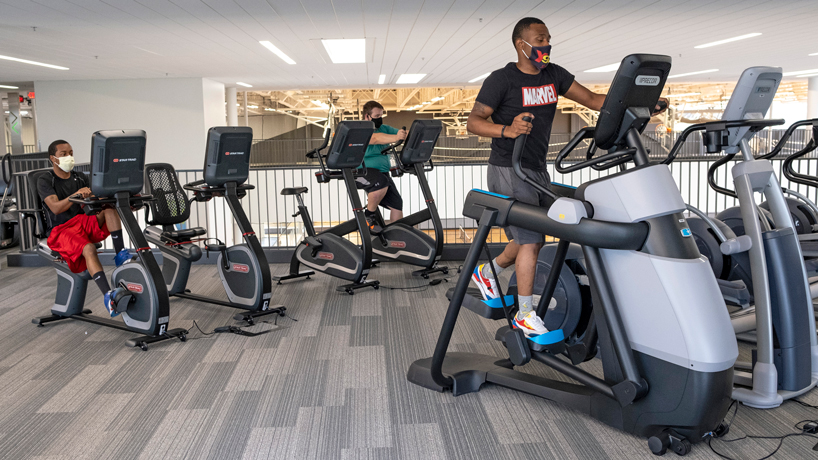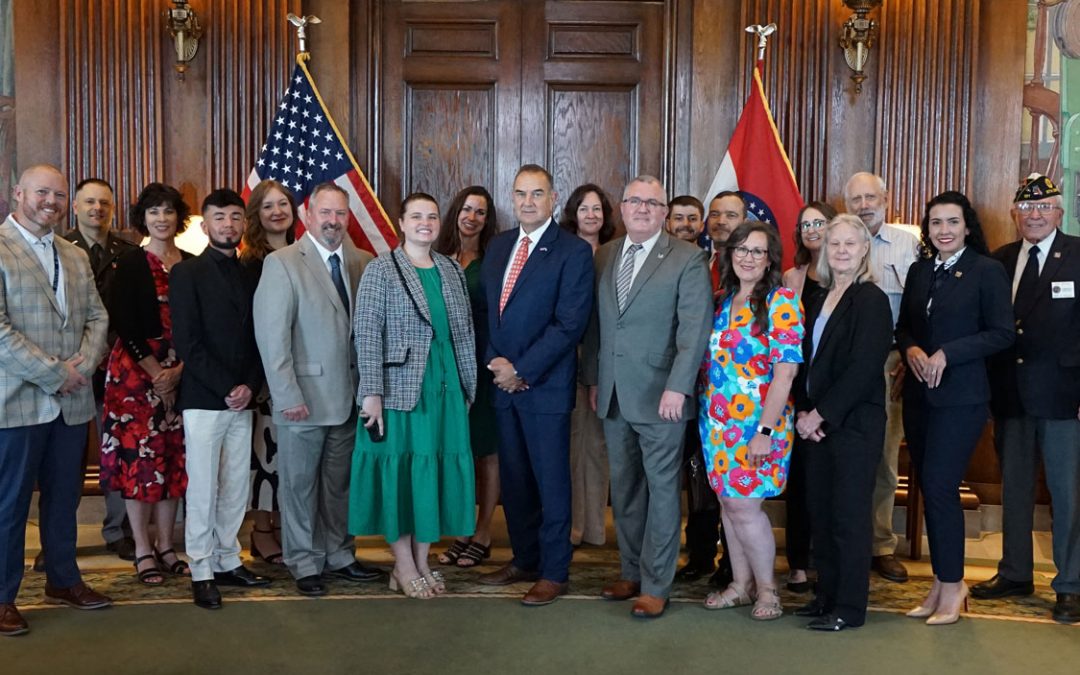
After a four-month closure, the Recreation and Wellness Center reopened on Aug. 1. Yvette Kell and the Campus Recreation team have worked to provide a safe environment for members during the COVID-19 pandemic. (photo by August Jennewein)
Without hesitation, Yvette Kell recalled the exact moment the Recreation and Wellness Center at the University of Missouri–St. Louis closed its doors.
“March 13, I remember the day so well,” said Kell, director of campus recreation. “We closed that evening, and we opened back up Aug. 1.”
That day, the University of Missouri System ordered the closure of recreation facilities at all system universities as a safety precaution due to the onset of the COVID-19 pandemic. Kell said she and her staff worked throughout the intervening four months to find a way to safely open the RWC in person – albeit in “fits and starts.”
“We were waiting for a lot of things to happen on campus in order for us to make some decisions and actually firm up plans on how we were going to open,” she said. “April, May and June were really about what we thought we could do and then waiting to hear back. Also, waiting for the county to come out with their guidelines – all of those pieces. It was a lot of starting and stopping, but in the end, I think we came up with a really good plan.”
Now, Kell; Emily Davidson, associate director; Andy Bruni, assistant director of student development and operations; and the entire Campus Recreation team, have put that plan into action. RWC members will notice a number of new policies and procedures designed to make entering the facility as safe as possible.
“We spent a fair amount of July putting trainings together for our staff because we had to bring them back first and get them ready to be in the building,” Kell said.
One of the most noticeable differences is that face masks are now required at all times, even while working out. Members who lift weights should also be aware that spotting is not permitted in an effort to comply with social distancing guidelines.
Staff members have also given high-traffic areas several updates.
At the front desk, plexiglass partitions have been installed to provide added separation for desk attendants. Additionally, RWC members will swipe their own IDs or use a mobile app that can be scanned from a distance to limit person-to-person contact. Signs with reminders to social distance have been posted throughout each level, as well.
The water fountains have been capped, leaving only the water bottle fillers operational, and the air hand dryers in the bathrooms have been replaced with paper towel dispensers.
Many of the activities and classes at the RWC are still available, but they will look different.
“When we first opened the building, the courts were closed,” Davidson said. “We reopened the courts when the semester began, but it’s a reservation process. You can only shoot basketballs, play racket sports or practice soccer skills out there. It’s limited to four people at a time on each half court.”
The rock-climbing wall is currently closed but is scheduled to reopen in October, and the pool is closed to replace the filtration system, which is unrelated to COVID-19. In-person classes will also limit the number of attendees, though the RWC has expanded virtual options.
“We were able to do a lot of virtual programming during the closure to keep that connection going,” Davidson said. “That was also involved in our plan. How do we incorporate what we’re doing virtually into a reopening so that members who aren’t comfortable coming in yet can still engage with us online?”
Bruni said it highlighted the value of more inclusive programming, and it’s something the RWC will continue to provide moving forward.
“It forced us to rethink how we can provide different offerings and different services and be more creative,” he said. “That made us push the envelope.”
Another significant aspect of the reopening plan is daily deep cleaning.
“We have a mid-day shutdown Monday through Friday where we do a deep clean throughout the facility, which requires mopping and cleaning all the equipment,” Kell said. “Then, throughout the day, our student staff are going around constantly cleaning high-touch areas and making sure that we’re maintaining all of the pieces from a disinfectant standpoint.”
Aside from the mid-day shutdown, the facility is also closing an hour earlier during the week – 9 p.m. Monday through Thursday and 8 p.m. Friday – to accommodate extra cleaning by the custodial staff.
Thus far, members have responded well to the new changes. Kell attributed it to reopening in August. She speculated that people had likely gotten used to wearing masks and similar changes in procedure elsewhere, leading to a smooth transition.
There have still been a few growing pains.
“The biggest one that we’ve seen is people wishing they could have spotters,” Bruni said. “That’s the one where we’ve seen the most pushback. It’s easy to see why. We’re asking them to completely change what their workout routine might look like. That’s a big change, but you have to be able to maintain that social distance, and it’s impossible to do safely if you’re spotting somebody.”
Davidson said members should be conscientious about the weight they’re lifting on their own because of this. It’s just one way of many they might have to adjust their workout routines – particularly if regular exercise habits were disrupted while quarantining.
“I think all of us felt that over the closure,” Davidson said. “Inactivity was a part of life for a little while, and it was difficult to motivate yourself. The biggest thing to remember is start slow, don’t overexert yourself. Especially if you’re coming to a facility where you’re having to wear a mask, your workouts have to change so that you’re making those adjustments and adaptations and not overtaxing yourself or putting too much stress on yourself.”
Bruni also stressed that the atmosphere in the RWC is unmistakably different, but that shouldn’t discourage anyone.
“If you put too much pressure on that first trip back and it doesn’t feel right, then it’s very easy to be like, ‘Well, that’s not the place for me anymore,’” he said. “So, don’t put too much pressure on that experience being the thing that shakes you out of whatever is going on.”
Even with the changes, Davidson believes the RWC can be a connection to the UMSL campus and fellow Tritons during a time when it’s very easy to feel disconnected from others.
To that end, students who were actively enrolled during spring or summer semesters have active memberships until Feb. 1. Faculty and staff can also purchase new memberships right now, though no guest passes are being issued.
Ultimately, Kell hopes the RWC can be a positive refuge for the UMSL community.
“We know we’ve all been under a lot of extra pressure in the last few months; the world’s getting heavier and heavier,” she said. “But finding time for yourself to really work on that well-being and that physical part of the well-being, whatever that may be for you, is important.”














